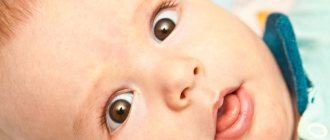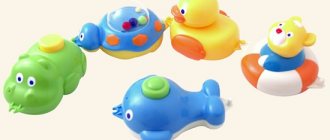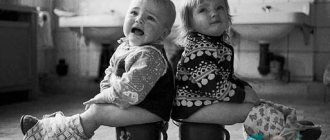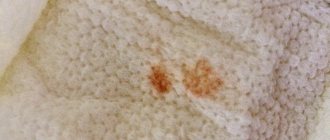About the child’s excretory system in the first six months of life
The frequency of going to the toilet in the first 6 months of life is associated, first of all, with the mother’s nutrition, if the child is breastfed, or with an adapted formula, if he is artificial. When breastfeeding, the baby can poop 7 or 8 times a day and this fact is considered the norm. You should also not worry if he does this less often, but does not experience any unpleasant sensations (does not puff, does not push).
Mothers who plan to feed their child for a long time should watch what they eat, because some foods have a laxative effect (apricots, plums) and, passing through milk to the baby, weaken the immature gastrointestinal tract, which is why the child poops often.
If a child is fed formula, his stool is usually thicker and darker than that of those who feed on mother's milk and he may poop 1-3 times a day, which is considered normal. The main thing is that the discharge is homogeneous and does not have an unpleasant odor.
We should also talk about the baby’s stool in the first days of life. After birth, you may notice black stool passed, which is called meconium. Pediatricians don’t see anything wrong with this; after a while, the discharge will lighten and become of a uniform consistency.
Is treatment necessary for frequent bowel movements?
A stool analysis will help determine the cause of bowel dysfunction.
If a child poops frequently, he does not always need treatment. It all depends on the reasons for frequent bowel movements.
If it was caused by a change in complementary foods or the consumption of laxative foods by a nursing mother, you should wait a little and then the stool will recover on its own.
Read: Diarrhea during pregnancy: treatment of a dangerous condition
If, with increased bowel movements, the child begins to experience discomfort, signs such as vomiting, fever, skin rashes, and swelling appear, you should immediately consult a pediatrician. In addition, changes in the appearance of feces should also alert parents:
- greenish tint and other color changes;
- foreign impurities (white lumps, elements of mucus, blood);
- change in consistency.
But even when contacting a treating specialist, it is impossible to make an accurate diagnosis based on external signs. To determine the nature of the disorder and the type of disease, the child must undergo a series of tests:
- general blood and urine tests;
- stool analysis;
- Sometimes a biochemical blood test and other specific laboratory tests may be required.
Also, to clarify the diagnosis, a coprogram may be required - a study and assessment of the physical and chemical composition of the stool contents, its properties, and existing pathological inclusions. Depending on the test results, the doctor makes a conclusion about the presence of the disease and draws up a method of treating it.
Serious disturbances in the functioning of the child’s body require hospitalization of the child and constant supervision of the treating qualified specialist. If outpatient treatment is possible, the doctor prescribes medications and determines the date of re-appointment to determine the effectiveness of treatment and the need to continue it.
In case of minor intestinal disorders, a specialist may advise changing the diet and composition of the diet. It is sometimes difficult for parents to determine the cause of a particular health problem in their child, especially in the early stages of his life.
But with time comes experience. If your baby has frequent bowel movements, you should remember that among its causes can be both normal (change of diet) and pathological (poisoning, infections of various kinds, etc.).
Therefore, it is necessary to closely monitor the baby, maintain normal sleep, activity, and nutrition. If you suspect a disease, you should contact your pediatrician. And then there is every chance to raise a healthy child.
This video will tell you how to deal with diarrhea in your baby:
https://www.youtube.com/watch?v=97NpP6QW-w4&t=8s
Read along with this article:
- Green poop in a baby: causes, methods...
- Green feces in infants as a symptom of dysbiosis?
- What to do if your one-month-old baby has diarrhea? In what cases does not...
- What to do if a newborn does not poop - a manual for mothers
- What causes diarrhea in a newborn, what to look for and...
- A newborn has a stomach ache, what to do, how to help and how to do it...
- A child has yellow diarrhea: when is this normal and when is it pathological?
- Mucus in baby's stool: normal or pathological
- There is a lot of mucus in the baby’s stool: what does the symptom mean, why...
What happens to the stool after the introduction of complementary foods
After about six months, babies begin to be slowly introduced to adult food. By 7 months, most babies are already familiar with some vegetables and fruits. If your child often walks around, start introducing your child to cereals that are a little firmer. Starting with the introduction of complementary foods, children go “big” less often, about 5 times those who are breastfed and 2-3 times those who are bottle-fed; with the help of complementary foods, you can adjust the frequency of going to the toilet (fruits help you cope with constipation, and porridge - with frequent urges).
A child poops often: how to react and what to do?
Above we talked about the standards that a baby should fit into. You need to start sounding the alarm if your child poops more than 10 times a day. Changes in color and consistency are also a cause for concern. In this case, you can suspect that the baby has insufficient enzymes.
Sometimes, in case of gastrointestinal dysfunction, they talk about lactose deficiency (lack of the enzyme lactose), in which it is very difficult for the baby to digest breast milk and stool upset occurs - it becomes very frequent and liquid, or, on the contrary, constipation may be tormented. So if your baby poops too often, get a stool test for lactose intolerance to rule out an enzyme deficiency.
In addition to this, pediatricians name several other reasons why a child may defecate too often:
- Diarrhea, or stool disorders, is associated with poor nutrition of the baby. It may be that you gave your child a lot of fruits, which weaken the intestines. This condition can be corrected at home by giving your child anti-diarrhea medications. If diarrhea persists, it is better to consult a pediatrician. Remember that diarrhea for an infant can be very dangerous, so give him water as often as possible, adding a drug like rehydron to the water, which prevents salts from being washed out of the body.
- Intestinal infection. If, in addition to diarrhea, the child also has a fever, you should immediately show him to a doctor. If left untreated, an inflammatory process may develop due to bacteria entering the cracks of the rectum.
- Dysbacteriosis. A fairly common phenomenon characterized by a sharp decrease in “good” bacteria. With dysbacteriosis, an unpleasant odor, loose stools, and undigested pieces of food are observed. You need a doctor's consultation and proper treatment.
Cackling with difficulty breathing
It happens that there is no acute respiratory infection and there never was, and the coughing is caused by other breathing disorders. For example, active children who jump, run everywhere and, accordingly, fall due to injuries, often have a deviated nasal septum.
In this situation, breathing is disrupted, the person begins to breathe through his mouth, he opens it wide, bacteria immediately enter the throat, inflammatory processes of the mucous membrane develop there and coughing begins. Also, these symptoms are characteristic of adenoid vegetation.
Treatment as such is not prescribed in this case. You need to try to eliminate the cause of the coughing. However, a deviated septum can only be corrected surgically in the clinic. A specialist will also help you deal with adenoids.
But parents can also help the baby. The child needs to be given more warm drinks. It doesn’t have to be milk; you can drink regular black tea, compote (only from non-acidic fruits) or jelly.
It is often recommended to drink warm alkaline mineral water that has been degassed. Under the influence of warm drink, the lymphatic and blood vessels that provide nutrition to the mucous membrane expand, and blood flows to the mucous membrane. This helps speed up the healing process of the affected areas.
For breathing problems, other folk remedies are also used. For example, if a child constantly breathes through his mouth and snorts through his throat, and it is determined that the cause is breathing problems, propolis oil may drip into the nose. And this is done daily, a couple of times a day.
For the procedure to be beneficial, it is best to instill in a lying position so that the child’s head is slightly tilted back. After the drops enter the nose, you need to lie down in a comfortable position for a couple of minutes - during this time the propolis oil will flow into the nasopharynx and begin to have an antiseptic effect.
St. John's wort oil has a similar effect. The procedure is performed in the same way as the instillation of propolis oil described above.
By the way, propolis oil is rarely sold in pharmacies in a convenient release form. But you can cook it yourself.
To do this, take propolis and any vegetable oil (it is advisable to take a high-quality purified product). The ratio of propolis to oil is 1:4.
Propolis needs to be crushed, mixed with oil, moved this mixture into a metal container, and then heated in a water bath so as not to destroy the beneficial substances contained in the oil or propolis.
The product is heated gradually over 45 minutes, and then it needs to cool. When this happens, you can strain it and discard the sediment. It is very important to choose the right propolis for these purposes. The darker the product, the less wax it contains and the more substances useful for treating breathing problems. So it’s worth choosing dark propolis.
St. John's wort oil is also prepared at home from plant materials, for which dried grass and leaves are taken. They will have to be ground for a long time in a mortar until a homogeneous powder is obtained, which, after brewing, will be ready for use.
Treatment of frequent bowel movements in children
Even the most experienced doctor will not be able to determine by eye why a child has frequent or loose stools. To do this, you will have to undergo some tests. After receiving the results, the doctor will determine whether the child needs treatment.
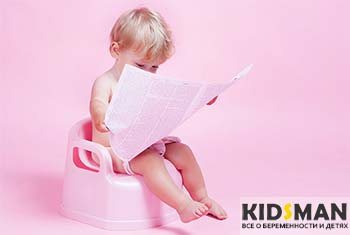
If the test results show nothing wrong, then you should calm down and stop counting the number of times you need to go to the toilet. It’s another matter if an intestinal infection is detected. In this case, the doctor prescribes treatment that can be done at home.
If lactose deficiency is detected, the doctor will prescribe special enzymes and recommend a diet to improve the situation. A deficiency of one or another enzyme in a baby under 1 year of age is considered normal, since his digestive system is not perfect and will become fully operational over time.
How to deal with dry air?
If the habit of coughing is caused by dry air, then all that is required is simply to ensure a normal microclimate in the house. The air should be clean, moderately humid (if you have a device, you can measure it, the air humidity should be at least 50%).
The optimal room temperature should be 18–20 °C.
If there is a children's room in the house, you need to try to ensure that it has the necessary minimum of upholstered furniture and textiles, otherwise it will be very difficult to humidify the air here. And without the listed sources of dust, it will be enough to carry out wet cleaning once a day to prevent this problem.
Please note that when coughing, even if you generally clean the room, it is not the quantity of sweeping and mopping that is important, but the quality. Many people use cleaning products that contain chlorine or its derivatives (for example, chloramine or bleach). Chlorine can cause burns on mucous membranes, including in healthy people.

